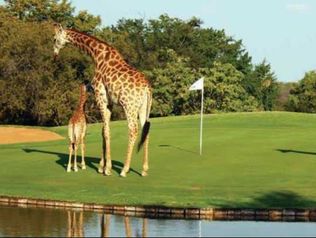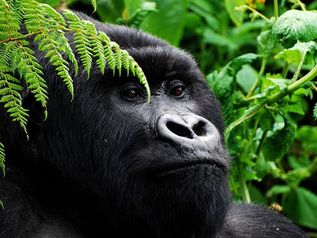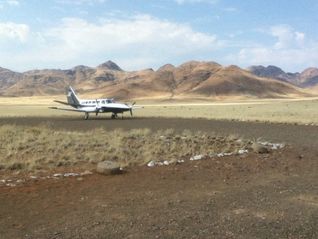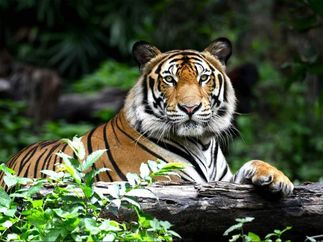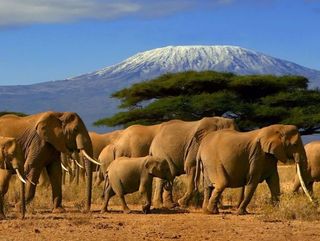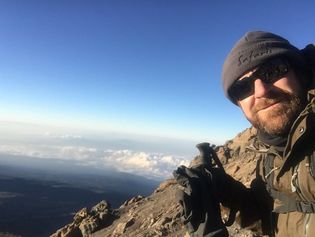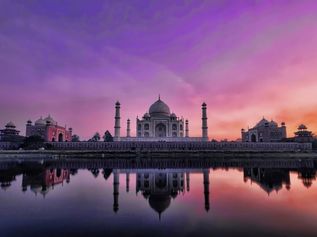|
Beat About The Bush Safaris specialises in tailor-made privately guided safaris to the prime wildlife, cultural, historical and scenic destinations of East & Southern Africa and South-East Asia (including India, Nepal, Bhutan and Sri Lanka)
Our focus is on wildlife and wilderness areas and the cultural and photographic opportunities they offer. With this in mind, our itineraries maximise time on safari and wherever possible exclude nights in cities. The highlights of these cities and other areas are available as safari extensions. In addition to customised safari itineraries, we also offer a number of set itineraries to all the major safari countries and combinations thereof and these are available where a specialist wildlife guide accompanies and leads the tour throughout (privately guided format) OR without a private guide where the local guides at each camp lead excursions (locally hosted format). |
Big Game & Golf Safaris |
Food & Wine Safaris
|
East African Wildlife Safaris
|
Seasonal Safaris
|
Expedition Safaris
|
Safari Extensions |
|
You will be experiencing new cultures and adventures on your safari and to ensure an enjoyable and trouble free holiday, certain protocols need to be followed. Whether walking in the bush, viewing game from vehicles or photographing people and places - let us guide you through this.
|
There are always a few experiences that stand out above the rest. In terms of the WOW-factor and if you are considering a safari to Africa or South Asia then we would strongly recommend that you consider including some of these must-do activities for mind-blowing experiences and memories to last a lifetime! We would be happy to include these activities in any tailored or sample itineraries in the regions where they occur.
|
FREQUENTLY ASKED QUESTIONS
How much does a safari cost?
Guided safaris to prime areas and lodges: USD1500–2000 pppn,all inclusive*
Non-guided safaris: USD 500 – 1500 pppn*, excluding certain services on some itineraries
*Exclusive of airfare and taxes to and from Africa and Asia.
Non-guided safaris: USD 500 – 1500 pppn*, excluding certain services on some itineraries
*Exclusive of airfare and taxes to and from Africa and Asia.
What is the ideal length of stay on safari?
For first-time safari-goers or those return visitors who are just wanting their ‘safari fix’ as part of a broader itinerary, a safari of minimum 6-9 nights in 2-3 camps in different, but complementary areas, is ideal and will generally result in a satisfactory wildlife experience without the feeling of having stayed too long or having missed out! It is recommended that 2-3 nights be spent at each camp. Two nights is, however, a bit rushed as it leaves only one full day to explore the area and should only be contemplated if there is no alternative. Three nights, on the other hand, affords two full days and ample opportunity to absorb what the area has to offer. A single night or a stay of more than 4 nights at a single camp is generally not recommended!
For the safari connoisseur, however, who is keen on getting off the ‘beaten track’ into remote areas to explore and experience a diverse array of geographical, cultural and wildlife highlights, a safari comprising 4-6 camps with 3 nights at each (12-18 nights) is recommended, thus enabling time to cross international boundaries – even between East and southern Africa!
For the safari connoisseur, however, who is keen on getting off the ‘beaten track’ into remote areas to explore and experience a diverse array of geographical, cultural and wildlife highlights, a safari comprising 4-6 camps with 3 nights at each (12-18 nights) is recommended, thus enabling time to cross international boundaries – even between East and southern Africa!
Is it safe?
It is recommended, and indeed a prerequisite of travel on our itineraries, that comprehensive travel insurance be purchased when booking your trip.
When visiting East Africa, we will organise ‘Flying Doctor’ medical insurance on your behalf BUT it is still important that you take out your own comprehensive medical cover for medical emergencies and evacuation.
When visiting East Africa, we will organise ‘Flying Doctor’ medical insurance on your behalf BUT it is still important that you take out your own comprehensive medical cover for medical emergencies and evacuation.
What about currency?
It is generally not necessary to convert to or carry local currencies in most of the safari countries. Foreign currency – most notably United States Dollar (USD) – is the most widely accepted, with European Euro and British pound less so! These currencies are generally accepted at most tourist establishments and the USD can also be used for gratuities and general purchases at street merchants, stores, etc. (except in South Africa).
The South African Rand (ZAR) is accepted in Botswana and Namibia.
As with all travel, travellers cheques are a safe way to carry money but these are not easily exchanged outside of the main centres. ATM’s are also not generally found outside of these centres.
Credit Cards are widely accepted with VISA and MasterCard being most preferable. American Express is not accepted in many lodges / hotels outside of the main centresAnswer to question 3
The South African Rand (ZAR) is accepted in Botswana and Namibia.
As with all travel, travellers cheques are a safe way to carry money but these are not easily exchanged outside of the main centres. ATM’s are also not generally found outside of these centres.
Credit Cards are widely accepted with VISA and MasterCard being most preferable. American Express is not accepted in many lodges / hotels outside of the main centresAnswer to question 3
Can children go on safari?
The industry is slowly changing to become more ‘children-’ and ‘family-friendly’ and lodges making allowance for children can be found in most safari destinations. The age policies do, however, vary considerably and the tendency is still not to allow children under 12 years of age at many of the smaller, more exclusive lodges unless the entire facility is booked exclusively.
It must be remembered that safaris – by their very nature of occurring in areas where there are wild, potentially dangerous and unpredictable animals, and where there is a non-negotiable need for safety rules and regulations to be adhered to at all times – are not the best holiday environments for children.
The lodges are often open to the wild (unfenced) and movements within the lodge confines and between rooms is restricted during the day and not allowed at night. In addition, the wildlife excursions are at least 2,5 hours long and movement and noise within the vehicle is restricted for safety reasons.
It is also unsafe and against the law in most areas with dangerous game species to undertake bush walks with children under the age of 12-16.
Most lodges are still not geared toward family accommodations with inter-leading rooms and most do not allow more than 1 child sharing with adults in a room.
We do not recommend that children younger than 5-6 years of age undertake a safari for the following reasons:
It must be remembered that safaris – by their very nature of occurring in areas where there are wild, potentially dangerous and unpredictable animals, and where there is a non-negotiable need for safety rules and regulations to be adhered to at all times – are not the best holiday environments for children.
The lodges are often open to the wild (unfenced) and movements within the lodge confines and between rooms is restricted during the day and not allowed at night. In addition, the wildlife excursions are at least 2,5 hours long and movement and noise within the vehicle is restricted for safety reasons.
It is also unsafe and against the law in most areas with dangerous game species to undertake bush walks with children under the age of 12-16.
Most lodges are still not geared toward family accommodations with inter-leading rooms and most do not allow more than 1 child sharing with adults in a room.
We do not recommend that children younger than 5-6 years of age undertake a safari for the following reasons:
- Children usually pay full rate on the small charter flights used between lodges, - child rates are not always available on these flights.
- Young children are not usually allowed to stay on a complimentary basis as long as they are with adults (as in many hotels) but are usually charged between 50% and 75% of the adult rate.
- Children battle to cope with the restrictive environments of the lodges and wildlife excursions.
- Children battle to cope with the long days, early mornings and late nights.
- In our experience, the safari experience fails to make an impression at such a young age.
What is the food like?
The food is generally very good in the establishments used on our itineraries. Meals are varied and the chefs will take special dietary needs into account. Meals and snacks are served regularly throughout the day. A common statement from visitors is that ‘ we are trying to fatten them up for the lions’.
In addition, and unlike in many other areas of the world at the moment, complimentary meals and snacks are still served on regional flights and long inter-camp transfer flights.
You certainly will not starve or want for food so you can leave the emergency supply of snickers at home!
In addition, and unlike in many other areas of the world at the moment, complimentary meals and snacks are still served on regional flights and long inter-camp transfer flights.
You certainly will not starve or want for food so you can leave the emergency supply of snickers at home!
Is the water safe to drink?
As a general rule in the safari areas of Africa, it is advisable to avoid drinking the tap water (especially in East Africa and Asia) – not necessarily because the water is contaminated or dirty but because your body will not be acclimated to the natural bacteria in the water and it can lead to an upset stomach. Bottled water will always be available for drinking, both in your accommodations and on the game excursions. In the establishments that we use on our safaris, it is also safe to utilise the ice, eat the salads, fruit and vegetables and drink the water served at meals (it has been decanted from bottles).
The safety of eating and drinking these latter items is unfortunately grossly misrepresented and exaggerated, especially by medical and travel advisors in the USA who think we live in the Dark Ages, and it leads to unnecessary stress and concern and can impact on the enjoyment of a safari.
The safety of eating and drinking these latter items is unfortunately grossly misrepresented and exaggerated, especially by medical and travel advisors in the USA who think we live in the Dark Ages, and it leads to unnecessary stress and concern and can impact on the enjoyment of a safari.
Are safaris relaxing?
The idea of a safari is to see animals and the animals are active during the coolest part of the day, namely the few hours either side of sunrise and sunset, while they seek refuge from the midday heat in the deep shade or impenetrable thickets. As such, the safari excursions (2 per day, 1 in the morning and 1 in the afternoon) are planned around these activity peaks, while the midday period is spent eating lunch and having a siesta, a swim at the pool, or whatever else grabs your fancy. The days can, therefore, become very long – especially in summer – where you are out from as early as 05h00 and only return from your afternoon excursion as late as 20h30 for dinner from 21h00 onwards! It is imperative, therefore, to utilise your rest periods wisely.
If you are a traveller who enjoys a sleep in and leisurely days with hours to spare then safari is not for you!! BUT….safari is an experience of a lifetime and well worth a disruption of routine and lack of sleep, both of which can easily be rectified upon returning home or with a post safari extension at a more sedate pace.
Essentially, you will need to adapt your daily routine and catch up on some of your lost sleep during the few hours between excursions. This is HIGHLY recommended and essential in order to avoid exhaustion and a negative impact on your enjoyment of the experience.
As a guideline, the morning wake-up is generally before sunrise in order to be out on the drive by or just after sunrise and, depending on the camp, breakfast is either served before drive or after you return.
Summer wake-up: as early as 04h30
Winter wake-up: as early as 05h30
Tea, coffee and biscuits (cookies) are served before the drive and you are usually given 30 minutes from wake up to departure of the drive if eating breakfast on your return and 1 hour between wake up and departure if eating before the excursion. If you need more time to get yourself ready for the excursion you will simply be woken up earlier in order not to compromise on the departure time.
Times are only flexible to suit your needs if you have a private car at your disposal and nobody else to consider.
If you are a traveller who enjoys a sleep in and leisurely days with hours to spare then safari is not for you!! BUT….safari is an experience of a lifetime and well worth a disruption of routine and lack of sleep, both of which can easily be rectified upon returning home or with a post safari extension at a more sedate pace.
Essentially, you will need to adapt your daily routine and catch up on some of your lost sleep during the few hours between excursions. This is HIGHLY recommended and essential in order to avoid exhaustion and a negative impact on your enjoyment of the experience.
As a guideline, the morning wake-up is generally before sunrise in order to be out on the drive by or just after sunrise and, depending on the camp, breakfast is either served before drive or after you return.
Summer wake-up: as early as 04h30
Winter wake-up: as early as 05h30
Tea, coffee and biscuits (cookies) are served before the drive and you are usually given 30 minutes from wake up to departure of the drive if eating breakfast on your return and 1 hour between wake up and departure if eating before the excursion. If you need more time to get yourself ready for the excursion you will simply be woken up earlier in order not to compromise on the departure time.
Times are only flexible to suit your needs if you have a private car at your disposal and nobody else to consider.
What is the daily programme?
The general safari itinerary involves two 3-hour excursions per day, one in the early morning and one in the late afternoon.
The times of departure change seasonally to make the most of the game viewing and to avoid the heat.
Dependent on which country and / or lodge you are visiting, programmes could be as follows:
Programme 1
Early wake-up; with or without refreshments
Breakfast
Morning Game Excursion
Brunch / Lunch
Siesta
Afternoon refreshments / High Tea
Afternoon Game Excursion (sometimes extending to after dark)
Dinner
Programme 2
Early wake-up with refreshments
Morning Game Excursion
OR
Early wake-up
Refreshments at the lodge followed by Morning Game Excursion
followed by
Breakfast
Bushwalk or other excursion (optional at some lodges)
Brunch / Lunch
Siesta
Afternoon refreshments / High Tea
Afternoon Game Excursion (sometimes extending to after dark)
Dinner
The times of departure change seasonally to make the most of the game viewing and to avoid the heat.
Dependent on which country and / or lodge you are visiting, programmes could be as follows:
Programme 1
Early wake-up; with or without refreshments
Breakfast
Morning Game Excursion
Brunch / Lunch
Siesta
Afternoon refreshments / High Tea
Afternoon Game Excursion (sometimes extending to after dark)
Dinner
Programme 2
Early wake-up with refreshments
Morning Game Excursion
OR
Early wake-up
Refreshments at the lodge followed by Morning Game Excursion
followed by
Breakfast
Bushwalk or other excursion (optional at some lodges)
Brunch / Lunch
Siesta
Afternoon refreshments / High Tea
Afternoon Game Excursion (sometimes extending to after dark)
Dinner
Are visas required?
Visas requirements will vary, dependent on the country visited and the nationality of the tourist. Although visas can in many cases be procured at the port of entry, it is recommended that visas be applied for and received prior to arriving in the destination country. This will not only save time, but will negate any possible problems with the process.
For country specific visa details, please see the Travelling Information page for each destination country.
For country specific visa details, please see the Travelling Information page for each destination country.
What about insurance?
It is recommended, and indeed a prerequisite of travel on our itineraries, that comprehensive travel insurance be purchased when booking your trip.
When visiting East Africa, we will organise ‘Flying Doctor’ medical insurance on your behalf BUT it is still important that you take out your own comprehensive medical cover for medical emergencies and evacuation.
When visiting East Africa, we will organise ‘Flying Doctor’ medical insurance on your behalf BUT it is still important that you take out your own comprehensive medical cover for medical emergencies and evacuation.

